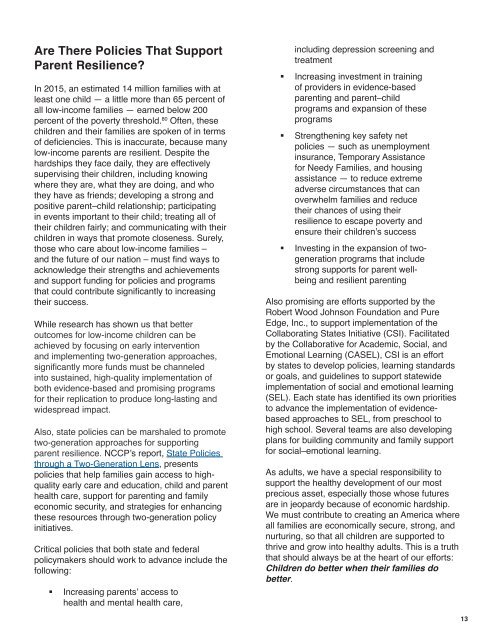NCCP_Resiliency_Brief_R6
You also want an ePaper? Increase the reach of your titles
YUMPU automatically turns print PDFs into web optimized ePapers that Google loves.
Are There Policies That Support<br />
Parent Resilience?<br />
In 2015, an estimated 14 million families with at<br />
least one child — a little more than 65 percent of<br />
all low-income families — earned below 200<br />
percent of the poverty threshold. 80 Often, these<br />
children and their families are spoken of in terms<br />
of deficiencies. This is inaccurate, because many<br />
low-income parents are resilient. Despite the<br />
hardships they face daily, they are effectively<br />
supervising their children, including knowing<br />
where they are, what they are doing, and who<br />
they have as friends; developing a strong and<br />
positive parent–child relationship; participating<br />
in events important to their child; treating all of<br />
their children fairly; and communicating with their<br />
children in ways that promote closeness. Surely,<br />
those who care about low-income families –<br />
and the future of our nation – must find ways to<br />
acknowledge their strengths and achievements<br />
and support funding for policies and programs<br />
that could contribute significantly to increasing<br />
their success.<br />
While research has shown us that better<br />
outcomes for low-income children can be<br />
achieved by focusing on early intervention<br />
and implementing two-generation approaches,<br />
significantly more funds must be channeled<br />
into sustained, high-quality implementation of<br />
both evidence-based and promising programs<br />
for their replication to produce long-lasting and<br />
widespread impact.<br />
Also, state policies can be marshaled to promote<br />
two-generation approaches for supporting<br />
parent resilience. <strong>NCCP</strong>’s report, State Policies<br />
through a Two-Generation Lens, presents<br />
policies that help families gain access to highquality<br />
early care and education, child and parent<br />
health care, support for parenting and family<br />
economic security, and strategies for enhancing<br />
these resources through two-generation policy<br />
initiatives.<br />
Critical policies that both state and federal<br />
policymakers should work to advance include the<br />
following:<br />
• Increasing parents’ access to<br />
health and mental health care,<br />
including depression screening and<br />
treatment<br />
• Increasing investment in training<br />
of providers in evidence-based<br />
parenting and parent–child<br />
programs and expansion of these<br />
programs<br />
• Strengthening key safety net<br />
policies — such as unemployment<br />
insurance, Temporary Assistance<br />
for Needy Families, and housing<br />
assistance — to reduce extreme<br />
adverse circumstances that can<br />
overwhelm families and reduce<br />
their chances of using their<br />
resilience to escape poverty and<br />
ensure their children’s success<br />
• Investing in the expansion of twogeneration<br />
programs that include<br />
strong supports for parent wellbeing<br />
and resilient parenting<br />
Also promising are efforts supported by the<br />
Robert Wood Johnson Foundation and Pure<br />
Edge, Inc., to support implementation of the<br />
Collaborating States Initiative (CSI). Facilitated<br />
by the Collaborative for Academic, Social, and<br />
Emotional Learning (CASEL), CSI is an effort<br />
by states to develop policies, learning standards<br />
or goals, and guidelines to support statewide<br />
implementation of social and emotional learning<br />
(SEL). Each state has identified its own priorities<br />
to advance the implementation of evidencebased<br />
approaches to SEL, from preschool to<br />
high school. Several teams are also developing<br />
plans for building community and family support<br />
for social–emotional learning.<br />
As adults, we have a special responsibility to<br />
support the healthy development of our most<br />
precious asset, especially those whose futures<br />
are in jeopardy because of economic hardship.<br />
We must contribute to creating an America where<br />
all families are economically secure, strong, and<br />
nurturing, so that all children are supported to<br />
thrive and grow into healthy adults. This is a truth<br />
that should always be at the heart of our efforts:<br />
Children do better when their families do<br />
better.<br />
13



